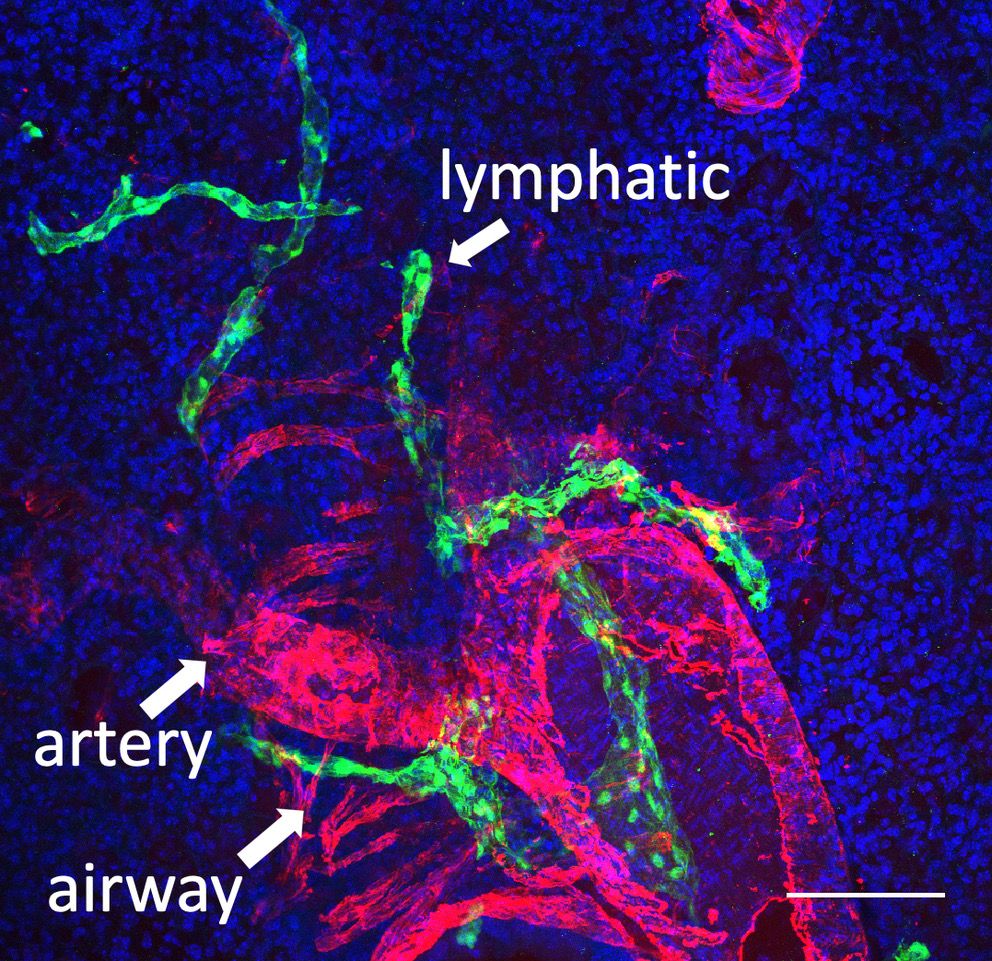
Research
The lymphatic vascular system has been described since the 16th century, yet these vessels remain mysterious with many unknown functions. Lymphatic endothelial cells form lymphatic vessels that are distinct from the blood vascular network and promote immune cell trafficking and fluid drainage in the form of lymph. Lymph itself is a unique combination of filtrated plasma, degraded proteins, and an immune milieu that changes with organ inflammation. Because of this, the function and content of the lymphatic vasculature represents the physiologic and pathogenic state of the organs it drains. The lymphatics were previously thought to be passive conduits, however, increasing evidence points to their active role in immunity, with substantial crosstalk between the trafficking leukocytes and the lymphatic endothelium. In the lung, lymphatic function is vital given its constant exposure to pathogens and its exquisite sensitivity to edema that would impair gas exchange. Previous work suggests a role for lung lymphatics in coordinating immune cell trafficking and inflammatory responses in models of asthma, fibrosis, and lung transplantation, but most of these studies lacked the tools to rigorously test the molecular pathways that dictate lung lymphatic function. The overarching goal of the Outtz Reed Lab is to answer the fundamental question: how does lymphatic function regulate lung homeostasis and drive lung injury during respiratory disease? Using mouse models of lymphatic dysfunction and lung injury as well as human tissue, we have found that the lymphatic vasculature plays a profound role in modulating the response to lung injury in unexpected ways, and that injury to the lymphatic vasculature is often an early event in the pathogenesis of lung disease. Our work has uncovered that fibrin-rich clots in the lung lymphatics may be a hallmark of several disease states that were previously unrecognized and indicative of detrimental thrombin signaling in the lymphatic endothelium. Furthermore, we have discovered that the lymphatic vasculature directly regulates the formation of tertiary lymphoid organs (TLOs) within the lungs. These TLOs resemble lymph nodes in their structure and organization have context-dependent roles in immunity and disease. Our lab is studying the pathways that regulate lung lymphatic vasculature function and how these vessels modulate the lung inflammatory milieu.
Figure 1 Whole mount fluorescent imaging of the mouse lung lymphatics (green). Pulmonary artery and airway shown in red.

Figure 2 Immunohistochemistry of human lung tissue demonstrating a fibrin-rich clot (green) in a lymphatic vessel (red) adjacent to a TLO in a patient with chronic lung disease.
Current Projects:
- Understanding lymphatic thrombosis and thrombin signaling in the pathogenesis of lung disease
- Defining the mechanisms of lymphatic endothelial cell-immune crosstalk in TLO formation and maintenance
- Lung lymphatic endothelial cell mapping in health and disease
- Development of inhaled nanoparticles for lymphatic targeting
Bio
Dr. Outtz Reed is an Assistant Professor at Weill Cornell Medicine. She received her undergraduate degree from Princeton University and her M.D./Ph.D. in Cellular and Molecular Biology from Columbia University. Her clinical training in Internal Medicine and Pulmonary and Critical Care was done at the University of Pennsylvania, where she also conducted her postdoctoral research with Dr. Mark Kahn. In her lab at Weill Cornell, Dr. Outtz Reed studies the role of the pulmonary lymphatic vasculature in lung homeostasis and disease.
Current Projects:
- American Thoracic Society Jo Rae Wright Early Career Investigator Award
- American Society of Clinical Investigation Young Physician Scientist Award
- Founder, NYC Lymphatic Research Group
